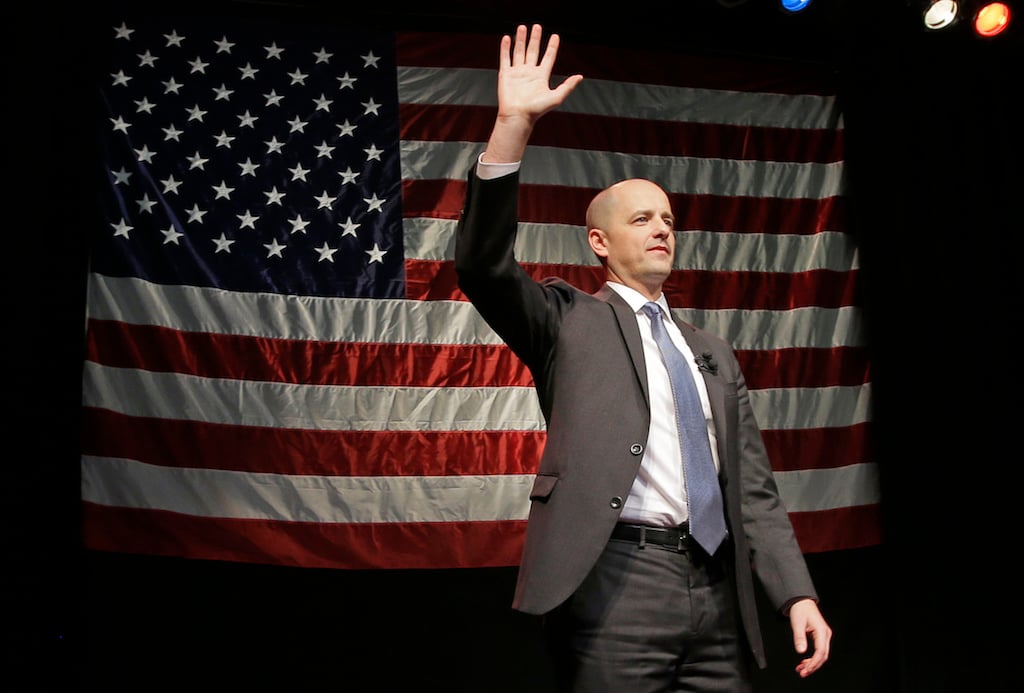On a recent Friday morning, I meet Evan McMullin at Bistro Bis, a sceney joint near the Capitol. That I managed to wrangle a meeting with him on short notice was lucky—later that day, he’s due west for three weeks, first for a family reunion in Seattle, then a conference in California. The conference, he tells me, is a chance to have conversations about “the future of liberal democracy in America.”
Ever since he launched his independent bid for president from a makeshift stage in Salt Lake City, McMullin has assumed the mantle of safeguarding conservatism—maybe democracy itself—from what he views as the “authoritarian” reign of Donald Trump. He won roughly one-half percent of the national vote in November, racked up nearly $670,000 in campaign debt, and, as McKay Coppins wrote recently, “endorsements from courageous conservative leaders never materialized.” Yet he’s managed to spin the flurry of attention that befell him last fall into a vocal anti-Trump brand, manifested, for the most part, in an active Twitter presence and frequent CNN appearances. He’s also running Stand Up Republic, a nonprofit he founded to defend “the democratic norms and institutions upon which the protection of our basic rights depend.”
McMullin’s newfound celebrity has been fruitful: he’s quoted often by reporters who need the conservative-but-anti-Trump perspective and has earned hundreds of thousands of Twitter followers, an esteemed feat in the eyes of the political-media class. (He’s curried favor on Twitter among the celebrity left, too: “I support @Evan_McMullin’s efforts to unite conservatives against the authoritarian danger Trump poses,” George Takei enthused earlier this year.) His tweets almost uniformly needle Trump vis-à-vis Russia, and he rarely comments on policy issues like healthcare. But it’s difficult to say who McMullin is trying to reach through this platform—disaffected conservatives? The left? Both?
That these questions need be asked underscores the muddled nature of McMullin’s activism, and the tenuous state of conservative “resistance” more broadly. In his first six months as president, just as on the campaign trail, Trump has not pantomimed any desire to govern as a movement conservative, an adherent to that William F. Buckley-founded credo of small government, free markets, and individual liberty. And yet prominent conservative lawmakers and organizations have done little to meaningfully denounce his most strongman-like moves, such as his firing of FBI Director James Comey. All of which means McMullin has been able to lay claim to a wide-open space on the right—a plum opportunity, but one that many conservatives believe he’s scuttled.
“I think because of the unique position he played in 2016, there was an opportunity there, and I think he squandered it,” says Noah Rothman, an associate editor of Commentary who voted for McMullin last fall. “Donald Trump is not a conservative and doesn’t lead as a conservative—McMullin could have played a big role in popularizing that view. But he did seem to pursue celebrity in lieu of that quiet, patient opposition.”
That quiet, patient opposition—what Rothman calls “behind-the-scenes” organizing via town halls, fundraising, and the like—is ostensibly what Stand Up Republic was founded to pursue. McMullin and his 2016 running mate, the well-regarded Republican operative Mindy Finn, launched the organization in January. At the time Finn told me it was intended to be a vehicle for the network of grassroots support they had built during their short campaign—ultimately, a way to continue raising money and “building a pro-free society movement.”
It’s been over six months since then, and I wanted McMullin to help me understand what he believes Stand Up Republic has accomplished and what the endgame is. “We produce digital content and promote it. And in a targeted way,” McMullin says of the 501(c)4. “And we also help organize, and promote conservative intellectuals, new and established, who write and speak on these issues.” (Which conservative intellectuals? Promote them how? “Well, I mean, they’re the ones you would know, certainly. I have to be a little bit careful in these because some of these sort of, you know, some of these groups are sort of private.”)
He continues: “We’ve run cable ads and digital ads. What we’ve mostly done is digital, digital engagement.”
For example, in March, Stand Up Republic launched a two-week cable ad campaign imploring Congress to investigate the Trump campaign’s ties to Russia. In April, the group launched another ad campaign demanding the release of Trump’s tax returns. (He won’t disclose who funded them.) “But,” McMullin says, “in addition to that we do advocacy…we leverage our grassroots network across the country that started with our campaign and that has tripled in size since.” He says the group has received financial backing from the Democracy Fund, which is led by eBay founder Pierre Omidyar (“up to $250,000,” according to Democracy Fund’s website).
But when it comes to engaging his supporters at the ground level, McMullin says there are no town halls or rallies or other events on the calendar.
By the end of our hour-and-a-half-long conversation, I still wasn’t sure to what end, exactly, McMullin hoped to “leverage” his “grassroots network.” Another go at the presidency? The beginnings of a new party?
Right now, he says, Stand Up Republic is “very focused on making sure” that a strong Russia sanctions bill becomes law. (This week, that bill passed in both the House and Senate, but McMullin insists–sounding oddly hopeful–that the President will veto it.)
They’ve launched a digital campaign, organized petitions and call-ins, and held meetings on the Hill regarding sanctions legislation (though he would not say which House members he had met with). “We’ve tried to put focused pressure on House Republican leadership, who I think are trying to weaken and delay advancing this bill.” That digital campaign includes nine posts on Stand Up Republic’s Facebook page urging people to call House leadership to #StandUpToRussia, and another post linking to an online petition. (Asked how visible those had been to leadership, one senior GOP aide said, “Who? The guy has zero credibility on Capitol Hill.”)
It’s understandable why McMullin may prefer Twitter and cable-news commentary to behind-the-scenes organizing: it’s much easier and cheaper to punch out a tweet from the makeup room before a TV hit than it is to travel and fundraise and lead town halls and connect with folks face to face. But many conservatives I spoke to suggested that McMullin’s prioritization of Twitter and political media also sheds light on his preferred audience. “I can’t quite figure out what his angle is…Unless you’re Trump, Twitter is not to the right scale,” says Republican operative Liam Donovan, who voted for McMullin. “It’s good for having a fervent following” among the Acela corridor-types, he says, “but it’s not great to parlay into anything else.”
McMullin admits that Twitter “is not the place where voters are. That’s Facebook. Or Instagram.” On Twitter, though, he emphasizes, “you reach influencers. That has serious value.”
It’s not a bad take. As Mark Leibovich so aptly put it in This Town, “the media [swoons] over Republicans with self-flagellating tendencies.” (McMullin no longer calls himself a Republican, but substitute the label for “conservative,” and the formulation still works.) So if one’s goal is to land slots on the Sunday shows, maybe a few New York Times bylines, it’s hard not to see retweets (from the right set, of course) as a valuable currency.
Which is a perfectly fine target, says Daily Beast senior columnist Matt Lewis, if you aspire to be a writer or talking head. “If someone is a commentator who bloviates and maybe causes people to reflect, that in itself is a success,” Lewis says. “But if you are ostensibly the leader of a political movement, or standard-bearer for a party in waiting, then there has to be some kind of tangible endgame—maybe it’s leading a primary challenge in 2020, or maybe it’s more modest, providing a platform for candidates at the state and local level.” (McMullin says he’s unsure whether he’ll run for office in 2018.)
“But if you’re posturing yourself as leader of a movement,” Lewis adds, “where are the soldiers?”
I’m not convinced McMullin has missed his chance to amass them. Indeed, as Donovan puts it, “he couldn’t have asked for a better opening” than his 2016 run, which came with the blessing of high-profile conservatives such as Weekly Standard founder Bill Kristol. But it’s worth considering whether McMullin’s affect, which can seem shrill or self-righteous, will ultimately alienate the very Americans whose support he needs most, either for Stand Up Republic today or his own hypothetical bid for office next year. “Let’s keep in mind that some of the Trump loyalists out there, like my mom in Pennsylvania—we’re going to need them to be part of a conservative movement going forward. There aren’t enough Jonah Goldbergs in the world to win an election,” Lewis says. “You’re going to need good, decent rank-and-file conservatives who voted for Trump. Reflexively criticizing him, even when he’s right, will obviously alienate those people.”
That’s valuable advice if McMullin does, in fact, want to run for office, or rally his iteration of “the Buchanan Brigades.” But he may decide a nightly spot on a CNN panel, talking about the president’s latest missteps, is all he needs. One thing seems clear: when he finally makes up his mind, the first to know will be those following him on Twitter—perhaps a fact that makes him not so different from Trump after all.















